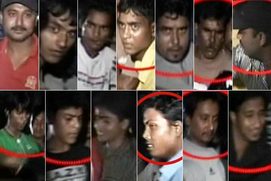
Guwahati, July 14: Five days after a teenaged girl was molested by a mob in Guwahati, nine of the 13 accused are still roaming free. The police have been able to arrest only four people so far.
The incident has once again stepped up the 'safety for women' debate in the country. It also raises other questions as to how can we prevent incidents like Guwahati from happening again and also whether there is no fear of the law in India.
Speaking to CNN-IBN, Team Anna member Kiran Bedi said, "It's a case for intelligent policing. Secondly, it's a case for better deployment, better people at the right places, people who know policing. And third, co-opt people in peace time. Unless you co-opt civil defence, home guards, resident associations, market associations and even have cameras outside the pubs which means a case for co-option."
BJP leader Smriti Irani said, "We've become a nation of headline chasers. Our outrage lasts till the headline lasts. We forget that girls molested and sexual harassment on the streets of this nation everyday."
Human rights lawyer Vrinda Grover said stronger laws against sexual harassment and molestation were required in the country. "All of them are bailable offences. We have been pleading with the Home Ministry to please pass the Criminal Law amendment to change the law relating to sexual assault. It is not on the priority of the Home Ministry."
The incident, which has sparked a nationwide outrage finally forced the Assam government into action. Chief Minister Tarun Gogoi appointed a special task force to look into the matter. The Chief Minister talked tough on the incident saying, "No one has the right to molest anyone."
"I have asked the police to keep a vigil on the anti-social elements," said Gogoi.
A three-member National Commission for Women team will also be reaching Guwahati to condict a probe. Meanwhile, across Guwahati, posters of the 13 accused were put up to help the police nab them.
Home Minister P Chidambaram had exhorted the state government to take action.
The Deputy Commissioner of Kamrup District, Ashutosh Agnihotri, too said that strict action will be taken against the accused. He, however, admitted that the police could have acted faster. "The police could have been a little faster to reach the spot. I have asked the SP to inquire into the delay," he said.
The Assam Police has managed to identify only 13 of the accused and arrest only four of them, almost five days after the incident. The victim had gone to celebrate her friend's birthday at a city bar where a man passed an obscene remark at her. This led to an altercation in the pub whose management asked them to leave. Once outside, the man followed her and passersby joined him.
The entire incident was shot on camera by a News Live cameraperson and is now viral on the Internet. Upon being questioned on the ethics behind shooting a molestation incident live and airing it, the channel said they did it "in public interest".
Syed Zarir Hussain, the Managing Editor of the TV channel, said, "Had we stopped rolling the camera, these molesters would not have been arrested. What we did was in public interest. On the night this incident happened, we showed only the molesters. We took a call to show the incident the next day as we realised that the molesters would not have be arrested. Whatever we did, we did for public interest and it is because we showed the video that four people have been arrested."
"The civil rights group in Assam had been insensitive to the incident," he added.
He further said, "The police was informed the moment this incident happened. There were two camerapersons and two people cannot take on a mob. So do not blame the media.
"How can the cameraperson be blamed for the accused looking at the camera and smiling?" he asked. "The serious point is that not a single group has come out on the street to protest against the incident. The media launched the campaign..."
He went on to add, "There were lots of people shooting the incident on mobile phones. The TV camera was ours. We were at a strategic location and we reached there. The question of ethical and unethical comes later."
The Assam DGP, Jayanta N Chaudhary, however, has promised action against the accused. He said, "The girl had gone to celebrate a friend's birthday... There (at the bar) they had a fight and the management asked them to leave as they were creating a ruckus over there... they came out and some hooligans saw her and tried to take advantage of her... She was assaulted but is not hospitalised... Whatever is there in the law books, we will do accordingly thanks to the coverage of media... They have been a great help."
Crime rate against women second highest in Assam: NCRB
The National Crime Records Bureau's NCRB latest statistics revealed that Assam has become one of most vulnerable places in the country in terms of crime against woman.
- According to the latest NCRB figures, the rate of crime against women in Assam was the second highest in the country in 2011 with 36.6 per cent.
-Assam's rate represents a jump from the 33.5 in 2010.
-The state of Tripura, which topped the chart in the category, was only a marginal 0.1 per cent ahead last year.
-Tripura has reported the highest rate of crime against women at 37.0 during the year 2011 as compared to 18.9 crime rate at the national level
-The NCRB report further said, There were 2, 28, 650 incidents of crimes against women in the country out of which Assam registered 11, 503 incidents.





Comments
Add new comment